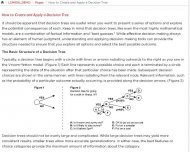Cornell methods of decision management
 Hospitality Leadership Through Learning
Hospitality Leadership Through Learning
Executive Decision Making
Course Cost US$769
Hours to Complete Course:
Course Focus
In today's competitive business climate, it is imperative that executives know how to make key decisions quickly and decisively. Strategic decisions often entail considerable risks and can have long-range implications for the organization.
In this course, participants will learn how to apply formal decision-making processes in order to reduce risk and choose the best course of action for their organization. They will learn methods and techniques for making critical decisions in a challenging environment with limited time and resources. This course focuses on how to maximize available assets, identify risks and obstacles, and gather the necessary data for an informed decision-making process.
Who Should Take This Course?
This course is a priority for executives, managers, and team leaders responsible for their organizations' strategic and operational decisions.
Key Benefits
The Executive's Decision-Making Tasks
• Organizational factors and personal characteristics that affect decision making
• Framing and categorizing situations to aid in making effective, objective decisions
• Conducting decision-tree analyses
• Gathering data and evaluating it for completeness, relevance, and possible bias
Formal Methods for Executive Decision Making
• Most common formal methods and when to use them
• Bayesian analysis
Faculty
- Florence Berger, Ph.D., Professor Emeritus, School of Hotel Administration, Cornell University
- Judi Brownell, Ph.D., Professor, School of Hotel Administration, Cornell University
Levels
Course Format:
Our online courses take a problem-based approach to learning, and we build each course around realistic case studies and scenarios. All courses are self-paced, and are managed by an online facilitator who leads the online discussions and is available to answer any questions about the course content. You will have a 2-week instructional period at the beginning of the course within which you will complete the required elements of the course. You will have access to the course content for an additional week following the instructional period.
You might also like

|
Governing the Commons: The Evolution of Institutions for Collective Action (Political Economy of Institutions and Decisions) Book (Cambridge University Press)
|
The Guinness World Record for the Largest Data Warehouse: A Q&A with Tom .. — B-EYE-Network
Business unIntelligence—Insight and Innovation Beyond Analytics and Big Data Summary Is there still a need for the data warehouse? In this excerpt from his new book, Barry Devlin looks at why the data warehouse can no longer retain its old role of ..

|
Common Sense Purchasing: Hard Knock Lessons Learned From a Purchasing Pro Book (Apollo Solutions)
|




